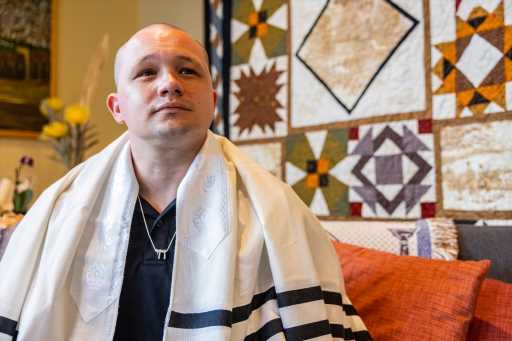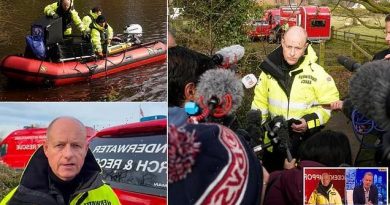Denver paramedic finds spiritual home after shooting at Jewish school
Justin Hovey found the rabbi in the emergency room’s waiting area.
Hovey apologized for acting brusquely at the Orthodox boarding school off West Colfax Avenue earlier. He was trying to stop the bleeding from the teen’s gunshot wounds.
Hovey was the first Denver Health paramedic on the scene after one of the school’s students, 18-year-old Shmuel Silverberg, was fatally shot by teens on a crime spree throughout metro Denver.
When Hovey arrived, he found three rabbis tending to the boy just inside the front doors of Yeshiva Toras Chaim. He had to push them away so he could intervene and move the teen into the waiting ambulance.
The rabbi in the waiting room wasn’t offended. He thanked the paramedic.
“He told me that it’s just in God’s hands now and the outcome will be the outcome,” Hovey said. “And that’s something that stuck with me.”
Shmuel’s death in the Aug. 17, 2021, shooting became a pivotal moment in Hovey’s life.
Hovey had treated thousands of patients in his 12 years as a paramedic. He’d treated other gunshot victims, other young, innocent victims of crime. But that night he sat alone in the ambulance bay and cried for Shmuel — only the second patient he’d ever cried for.
Hovey, 35, couldn’t stop thinking of the young student over the next few months. He thought of the three rabbis urgently tending to the boy as he bled, treating him as if he were part of their family.
That’s what Hovey had always wanted — a spiritual home, a connection with a larger community.
Hovey grew up Catholic in rural Iowa. But as a gay man, he never felt truly welcome in the church. He’d been curious about Judaism for years. He was fascinated by the history and the millennia of tradition. After the shooting, he thought: Why not now?
“I had never stepped foot in a synagogue,” he said. “I had never spoken to a rabbi or cracked open a Torah.”
He researched synagogues and rabbis in Colorado and found a conversion class curriculum with Rocky Mountain Rabbis and Cantors. He emailed the rabbi leading the class before signing up. He told the rabbi that he was gay and he had no Jewish background. He asked if he could still take the course, fearing rejection.
“He told me that Judaism is for everyone and you will be accepted and loved no matter what,” Hovey said.
It was the acceptance Hovey had longed for his whole life.
“What I didn’t know at the time is that there’s a Jewish commandment from Torah that says we shall love and accept the stranger,” he said. “And at that moment, that’s what I was. It was something I wasn’t expecting. But I was still nervous just because I had heard similar things all through my life and it doesn’t always turn out to be that way.”
Hovey enrolled in the classes in the spring of 2022. He also needed to find a rabbi to sponsor him. He started cold-emailing rabbis in the Denver area and received slow or no responses — until he emailed Rabbi Benjamin Arnold from Congregation Beth Evergreen. Arnold gave Hovey an unequivocal “yes” and invited him to an LGBTQ Pride-themed Shabbat service.
Hovey and his husband went to the service. From then, everything fell into place.
As part of the formal conversion process, Hovey had to take on a Jewish name. He thought of Shmuel, the night that finally prompted him to seek a new faith. He researched what the name meant.
“It means, ‘God has heard.’ I thought about that for days,” Hovey said. “Oftentimes we hear about people listening to God, or listening for God, but not the converse of that — that God hears us.”
He wanted the permission of the Silverberg family. He was able to send a message to them through the district attorney’s office. A few weeks later, he got a call from the East Coast. He spoke with Shmuel’s mother, answered her questions about that night and asked for her permission.
Silverberg was touched, Hovey said, and gave her permission.
“Mostly, I just wanted her to know that Shmuel’s memory was a blessing,” he said.
Hovey formally converted on May 18, two weeks before three of five suspects were sentenced to prison in connection to the crime spree and Shmuel’s death.
Hovey felt like he fit in at Congregation Beth Evergreen and within the beliefs of Judaism. He and his husband moved to Evergreen in October.
“I realized that I had found my spiritual home,” he said.
He still thinks of Shmuel, how that traumatic night eventually became something meaningful. He wears his yarmulke every day, inviting conversation from curious strangers.
“Even to this day, I never have learned how to be a proud gay man,” Hovey said. “I don’t know how to do that. But one of the things I very early decided is that I will be a proud Jewish man.”
Sign up to get crime news sent straight to your inbox each day.
Source: Read Full Article




